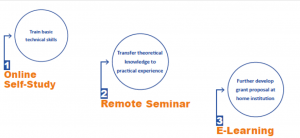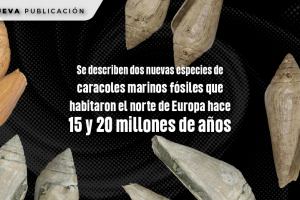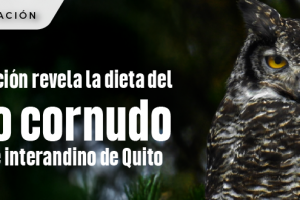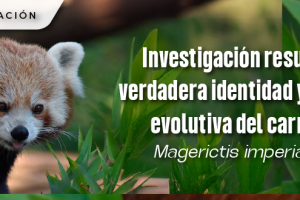Course offer: “Practical-Oriented Training for Researchers in Ecuador 2021”
Course given by experts from the German University of Cologne and proWiss Consulting Services for Researchers!
20 slots will be selected through this call! The course will be completely virtual, no funding costs will arise for the selected participants!
Deadline for submitting applications: August 30, 2021
Context
On behalf of the Federal Ministry for Economic Cooperation and Development (BMZ), the Program CoCiBio (Application-Oriented Cientific Cooperation between Ecuador and Germany on Biodiversity and Climate Change / Cooperación entre Ecuador y Alemania sobre la investigación orientada a la aplicación sobre Biodiversidad y Cambio Climático) is implemented jointly by the Deutsche Gesellschaft für Internationale Zusammenabeit (GIZ) GmbH, the Ministry of Environment, Water and Ecological Transition of Ecuador (MAATE), the National Institute of Biodiversity (INABIO) and the National Secretariat for Higher Education, Science, Technology and Innovation (SENESCYT). The objective of the program is: “The conditions for the development of science-based innovations in the areas of biodiversity and climate change are improved”.
The program seeks, among other things, to promote the practical application of research results, as well as the strengthening of scientific networks, which implies various capacity-building actions in the program’s counterpart institutions (MAATE, INABIO and SENESCYT) and academic actors. Within this framework, the program agreed with the German University of Cologne and the enterprise “proWiss Consulting Services for Researchers” to carry out a virtual course aimed at Ecuadorian science-related stakeholders from counterparts (MAATE, INABIO, SENESCYT, GIZ: 10 slots) and target groups of the program (institutions of higher education, universities and research institutes: 20 publicly advertised slots) to strengthen and apply their capacities to generate project proposals that allow access to different funding sources for biodiversity and climate change research and to encourage the networking between participating institutions and scientists.
| Practical-Oriented Training for Researchers: | Application Period: July 19th – August 30th, 2021 |
| Online Self-Study: September 7th – September 20th, 2021 | |
| Remote Seminar: September 21st – September 23rd, 2021 | |
| E-Learning Module: October – November, 2021 |
The aim of the course is to train stakeholders, researchers and PhD holders in developing a promising proposal for national or international research funding (every participant will have the opportunity to tailor their application to the research funding institution of their choice). Ecuadorian researchers from biodiversity or climate change related disciplines or research topics can apply for this course. The course is also an effective tool for promoting international research and relationships. The course language will switch between Spanish and English, being English the working language.Course description:
Learning Approach:
Using a blended learning approach, the course is structured in three sections: A self-study section, a remote seminar and a trainer guided E-Learning section.
Gráfico, ver pdf AQUÍ

- Online Self-Study Section (September 7 – September 20th, 2021)
The self-study section (provided by the University of Cologne on the ILIAS platform) will provide basic knowledge and basic technical skills that are needed to design, write, and budget a potentially successful grant proposal on the basis of about 13 learning modules, interactive exercises, and self-tests. The objective is to draw up a three-page draft proposal without workplan and budget. Workload: approximately 10-12 hours.
- Remote Seminar (September 21st – September 23rd, 2021) via Zoom
Attendance and active participation is required during the entire Remote Seminar which will be hosted live via Zoom. Workload: approximately 6h per day for three days.
Building on the preceding self-study section, the three-day web-seminar focuses on deepening the participants’ knowledge on drafting proposals so that they’re able to apply it practically to their own projects. The aim is to take the first steps to transfer the theoretical knowledge acquired to the participants’ own project ideas so that these ideas can be both adequately formulated and operationalized within a work plan. Participants should in the end be able to select a suitable funding agency and to design the application according to its formal and content-related requirements.
- E-Learning Module Section (October – November 2021)
During this e-learning section, which will start directly after the workshop, the participants will work on their proposal (including the creation of a workplan and a budget plan) and further develop it. Eleven online modules for self-study will be offered on the ILIAS platform. Each module includes additional learning materials and exercises. This content is specifically designed to help turn theoretical knowledge into practical skills that will help develop a successful proposal. One crucial part of the e-learning is online support in the form of regular live chats on the ILIAS platform through the trainers on fixed dates (5 chat groups with three 70min meetings each). Here, the trainers are available to answer questions about individual proposals. This accompanying counselling to the participants will deepen their knowledge and the process of refining their proposals and approaching funding sources. This will promote the further development of the 3-page exposé into a fully-fledged grant proposal draft of around 10 pages (with work plan and budget).
Trainer Profile
The two head trainers of proWiss are recognized key stakeholders among relevant third-party-funding agencies like DAAD, DFG, BMBF and EU and together with the University of Cologne they have been conducting jointly this kind of courses successfully for seven years for the German Academic Exchange Service (DAAD) in different regions of the world, amongst which is Latin America (https://portal.uni-koeln.de/international/im-fokus/dies-progrant/course-offerings). The trainers will share knowledge on important principles of grant writing that are independent of a certain disciplinary field and on fundamental structural elements that are required by most of the international funding organizations.
Partner Profiles
The University of Cologne: The University of Cologne (UoC) combines innovation with tradition in its research and teaching since its foundation in 1388, which establishes its academic excellence as one of the best-known German universities.
proWiss Consulting Services for Researchers: proWiss is a private research consulting firm supporting scientists and institutions of the higher education sector worldwide in raising external funds for research projects, capacity building and international cooperation. proWiss experts design and conduct training programs (workshops, e-learning courses) that are tailored to the specific needs of researchers, teaching staff and evaluators – with a special focus on regions in Africa, Asia, Latin America, and the Middle East.
Participant Profile
Potential participants are stakeholders, younger researchers and PhD-holders from Ecuador. Selection criteria are that participants:
- Must hold a doctoral degree or at least a master’s degree with a proven aspiration to proceed with research or PhD studies
- Have an affiliation to an academic, higher education or research institution in Ecuador
- Possess good English language skills, both written and spoken (since the work language will be English)
- Are committed to participate actively in all three phases of the course, as well as to evaluate the course after completion (e.g. give feedback on the benefits of the course for the personal research activity)
- Be preferably at the beginning or middle stages of their research career
Application Requirements and Process
Applications can be submitted at https://form.jotform.com/211923455814961. The Online Application Form will be available until August 1st, 2021. Please fill out all fields and upload all other application requirements (as mentioned below) on that form.
- Exposé
We request that you submit a 2-page exposé (approximately 5.000 characters in English) outlining your intended research project. The proposal should be written in such a way that a person without proper knowledge of the topic can make an assessment of the scientific value of the proposed project. The exposé should include the following sections and information:
- Applicant name, disciplinary area of the proposal, and title of the project (approximately 100 characters)
- Introduction of scientific background: Please introduce your research idea. Based on pertinent literature, please briefly demonstrate that there is a research gap and a need for this gap to be filled.
- Aim of the project: Please state the aim of your intended research.
- Approach: Briefly describe the procedure, e.g. the methods you are going to apply in order to achieve the aim of your project.
- Relevance: Briefly state the expected results; explain the relevance your project might have for scientific and non-scientific stakeholders, especially in the context of the implementation of strategic Ecuadorian policy strategies like the Estrategia Nacional de Biodiversidad, Estrategia Nacional de Cambio Climático and / or Agenda Nacional de Investigación sobre Biodiversidad.
- Motivation: Briefly state your motivation, commitment and reason to participate in the course.
In case you already know, please indicate the funding agency you want to apply to.
- Academic CV
Please provide a brief 1-page resumé of your academic career in English.
- Letter of Support
We ask that you submit a 1-page Letter of Support from the institution of higher education, university or research institute you are affiliated with. Your home institution should provide information about your relationship to, and functions at the institution, and express support in you participating in the course. In case you have been selected for the course, you will be asked to present another letter of support from your superiors, which will guarantee your full-time participation.
- File Format
Please title all pdfs according to the following examples: “familyname_firstname_expose”, “familyname_firstname_CV”.
Selection Criteria and Process
The applications are uploaded / received on the Jotform platform of the University of Cologne, where they are checked for compliance with the formal requirements and specifications (compliance with the submission deadline, completeness of the documents). Thereafter, the review of the application documents takes place (content-related selection), which will be done by an Evaluation Committee consisting of the counterparts of the CoCiBio program (GIZ, INABIO, MAATE, SENESCYT). The evaluated aspects and their respective weighting (qualification points) are:
- Relevance: The exposé and project idea is of evident scientific value (2 points). The project has the potential to produce a high quality scientific product or publication in the field of Biodiversity and / or Climate Change (2 points). Relevance for non-scientific stakeholders, especially in the context of the implementation of strategic Ecuadorian policy strategies (2 points). (6 points in total)
- Motivation: The applicants communicate a clear motivation, commitment and a substantiated reason to participate. (1 point in total)
- Qualification: Applicants must have a PhD or at least a Master degree with a proven aspiration to proceed with research or PhD studies, as well as a position at an institution of higher education, university or research institute. (2 points in total)
- English Level: The applicants show in the submitted documents and CV that they can communicate well in writing. (1 point in total)
Important: All 4 criteria are exclusion criteria not allowing a qualification of zero points in any of them to proceed. A balanced participation of men and women on equal terms will be considered.
Important Information
For the course, up to 20 applicants will be selected through this call. The accepted applicants will be informed of their selection no later than by September 6th, 2021. Participants who attend actively all three phases of the course will receive a course certificate.
The Deadline for applications is August 30th, 2021, 11 PM (Ecuadorian time).
Contact Information:
Miriam Factos (miriam.factos@giz.de)





